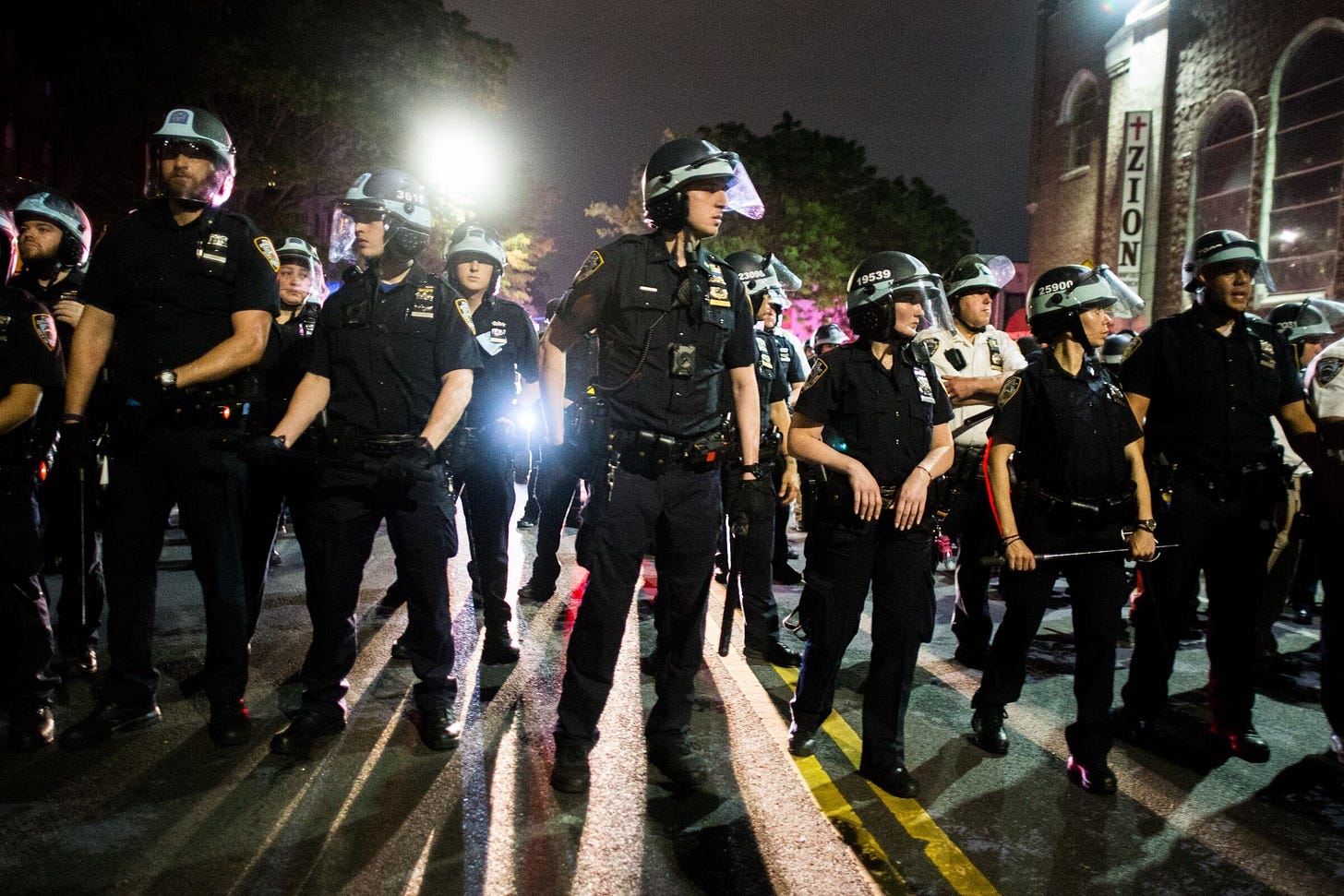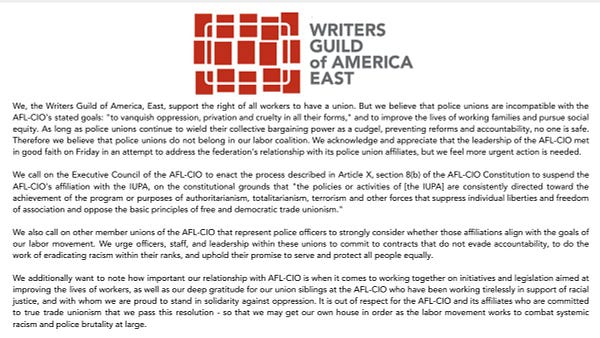
This week, in the wake of the nationwide uprisings against police violence, the Writers Guild of America East — of which I am a member, along with many of my Discourse Blog colleagues — became the first union to call for the AFL-CIO to break its ties with the International Union of Police Associations, as part of an effort for the labor movement “to get our own house in order.”
“As long as police unions continue to wield their collective bargaining power as a cudgel, preventing reforms and accountability, no one is safe,” the statement read. “Therefore we believe that police unions do not belong in our labor coalition.”


The WGAE was the first union to echo a demand already made by rank-and-file union members from across the labor movement — including those with the No Cop Unions coalition — as well as notable progressive and civil rights leaders and academics. But even with vocal and public support from one of its most visible affiliates, the AFL-CIO almost immediately and publicly rejected the proposal out of hand. At the end of a long thread in which it dismissed the calls to boot the IUPA while calling for police reform, the union federation said this:

The AFL-CIO later issued a statement repeating its support of police unions while adding further specifics about the kinds of reforms it is supporting; they mostly echo the mainstream tinkering proposed by Democratic Party leaders in recent days.
The statements are no surprise, as they echo comments defending police unions made both by AFL-CIO head Richard Trumka and, much more offensively, AFSCME president Lee Saunders. And it’s easy to see why the AFL-CIO would cling to the cops when you look at the numbers. The IUPA has over 100,000 members. The WGAE, according to council member and Discourse poet laureate Hamilton Nolan, has fewer than 7,000. The hard, meaningful, and uncomfortable choice in this situation would be to kick the cops out and side with the modestly sized writers’ group. The easy and comfortable choice is to keep the cops in.
That does not mean it’s the smart choice.
The uprisings which started after George Floyd’s killing, and have since taken on national and global prominence, amount to the largest, loudest, and most aggressive movement for progressive reform and equal justice we’ve seen in this country in decades. They have also been wildly successful thus far.
While the details are scarce, a majority on the Minneapolis City Council has announced a commitment to disband the police department. Public school districts are cutting ties with police departments. Police budgets are on the chopping block with an eye towards defunding them. People are furious at their city governments in numbers and intensity usually only reserved for members of whichever party controls the House at the time. On Tuesday, thousands of people stormed Seattle City Hall demanding the resignation of Mayor Jenny Durkan.
Are these people even listening to the patronizing Vox writers telling them this is a bad idea?
But just because this is a movement for progressive reforms doesn’t mean it has ties to existing progressive infrastructure. This is something altogether organic; the seeds were obviously planted by Black Lives Matters protests of the past, but people were even more moved to act because the brutality of George Floyd and Breonna Taylor and Ahmaud Arbery’s deaths exposed old wounds that exist in virtually every major city in this country. They were then moved to act again because even peaceful protests have been met with rank brutality by local police. It’s a local movement gone global.
Above all else, the movement is youth-led. This presents an opportunity for labor to show solidarity with the protesters and the fight for racial justice, and to show that commitment to young activists skeptical of traditional avenues of power. And though the AFL-CIO would lose numbers, it would also lose the dead weight of some of its most reactionary forces in exchange for the trust of the generation and the multi-racial working class that could rebuild the labor movement.
It would also help the AFL-CIO atone for some of the worst choices in its history, its willingness to collaborate in anticommunism and purge its members during the Red Scare not least among them. More recently, the AFL-CIO and many of its largest members have tied their fortunes together with that of the Democratic Party, and has been burned for it badly. This uprising is proof that there’s another way.
“The only solidarity [police union members] show is for their fellow police officers; other workers are mere targets,” WGAE council member Kim Kelly wrote in her call to abolish police unions last week. “Their interests, as well as those of other right-wing oppressors’ unions like those that represent ICE, border patrol, and prison guards, are diametrically opposed to those of the workers whom the labor movement was launched to protect.”
To suggest that the correct moral decision is to keep the cop unions in for purposes of dialogue is, for lack of a better term, a copout. No party to this conflict has shown less of a willingness to have a conversation about it than cops and their unions, which are more often than not run by the loudest authoritarians in the room.
Just last month, the non-AFL-CIO-affiliated Fraternal Order of Police in Chicago — one of the worst police departments in the country — voted last month for new leadership, and chose as its new president a cop who once filed a police report against his own superintendent for participating in a peaceful protest with clergy members. Does this sound like someone who wants to talk to you?
Tomorrow’s workers are knocking at the door. This is the time not only to cut the ties with the cops, but lay the foundations for a renewed organized labor movement that looks a lot like the protest movement we’re seeing now: Young, multi-racial, insubordinate and antagonistic towards the Democratic Party, and above all else, hungry for justice and angry as hell.
Photo: Jack Crosbie







They didn't call it the AFL-CIA for nothing.